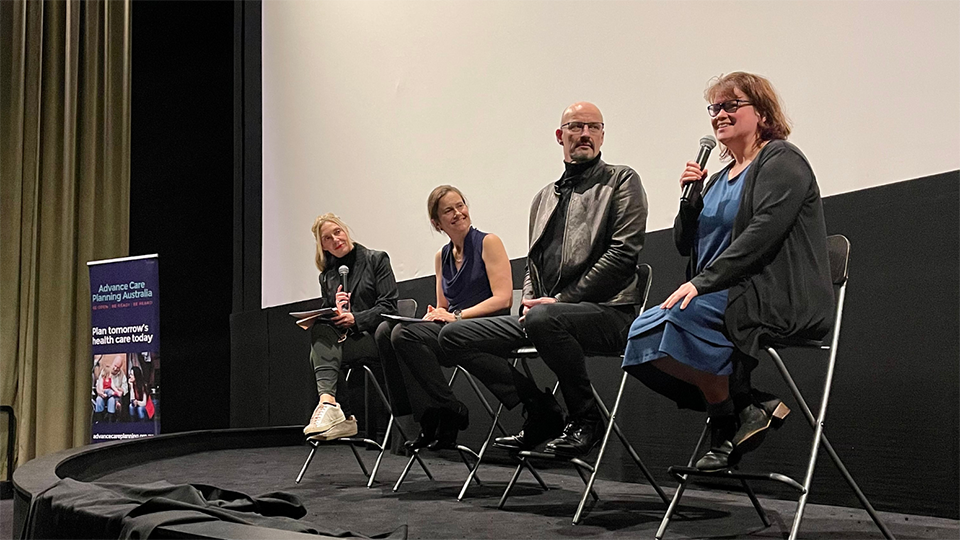
Advance Care Planning Australia held a special screening of Live the life you please at Palace Pentridge Cinemas on 8 June with a short film exploring advance care planning. The impact film campaign delves into the stories of real people as they share their personal experiences of palliative care. ACPA is proud to be a sponsor.
Xanthe acknowledged director Mike Hill who joined us for the screening and acknowledged Live the life you please recently won two Accolade Global Film Competition Awards:
Award of Excellence: Documentary Feature
Award of Excellence: Health/Medicine/Science
Following the film, we hosted a live Q&A with an expert panel including film presenter Simon Waring, journalist and author of 'What will I wear to your funeral' Kellie Curtain, Peter MacCallum Cancer Centre Deputy Chief Medical Officer, palliative medicine consultant Dr Sonia Fullerton and ACPA National Program Director Xanthe Sansome.
Presenter Simon Waring’s story of his journey losing his baby girl, young son Marmaduke and wife Millsom was a powerful way to begin the film and convey the need for everyone to have access to palliative care. At the end of the film, Simon explained, “I was accepting of this journey within my own family, and I wanted to walk the walk with others. It is so important to get this rich range of stories out into the community.”
Kellie said that after exploring her mum’s preferences with her before she died, she feels, “We really need to talk about how to find the good in goodbye. Because death is coming whether we are ready or not. The grief doesn’t stop. It continues but there is joy too.”
Simon shared, “It was a beautiful time with my son Marmaduke. It was a good death and a good bereavement. It can all have a positive impact on our lives.
“As a society, we put off conversations. When we talk about palliative care, we are not talking about adding years, but putting more life into those years. What would you want to see and what you would you want to leave behind when you’re gone?”
Xanthe reflected on the benefits of the film: “We hope you will be able to find advance care planning a little less confronting to talk about. If your family and doctors don’t know what you want, you may not get what you would choose for your end of life. An hour’s conversation may save two weeks in Intensive Care or interventions in Emergency that you don’t want. So be brave, be courageous. Talk to your family and talk to your doctor.”

‘I don’t know. We never talked about it.’
Sonia is a strong advocate for advance care planning as part of her role at Peter Mac. She said, “We want to put structures in place to prevent an ambulance taking you to Emergency if that’s not what you want. And we need palliative care to ease your symptoms so you’re comfortable.”
So many times in the bright, noisy Emergency environment, when I have had a patient in a critical condition who can’t speak for himself, I have tried to ask a patient’s wife, ‘What would he want?’ And the wife often looks at me distressed saying, ‘I don’t know. We never talked about it.’
“And when I try to talk to my patients about their preferences, and they say, ‘I don’t want to go there,’ I explain how advance care planning reduces the burden, anxiety and grief when someone dies. Then they want to start the conversation.
“I had a frail, elderly patient who had several fractures. If she had the surgery that was being considered, she would have had a very poor outcome. I found a beautiful handwritten advance care directive in her records from several years earlier. She made it clear that the last thing she wanted was to be in a nursing home. Because she had written her directive, she avoided surgery and got the peaceful death with her family that she wanted.”
‘A true act of love’
As Xanthe shared, “Only 15 per cent of people over 65 have an advance care directive so that’s a lot of people who haven’t formally detailed their health care preferences or appointed their substitute decision-makers. People may have had robust conversations - and sometimes that is enough. But often there is conflict in families because not everybody is at the same stage of acceptance at the same time, and potentially, not everyone thinks that the person who is dying wants the particular treatment that is being offered.
“It is an act of love to be able to share your preferences with everyone involved in the decision-making process while you still can - so everyone is on the same page. And if you have been part of these discussions, you can unite and focus on the person, not the decision-making. There is no conflict. And you can love the person into their next life or into death.”
Simon reflected, “So many stories and emotions in this film resonated with me. Even though the stories covered different conditions, different parts of Australia, and different family set ups, the common threads are universal. Every time I see some of those stories, the tears well up. If we pull the veil away, and if we don’t hide these tales away, we can see they are just beautiful love stories.”
If you missed out on our screening, you may be able to find another session on the Live the life you please website.
You can watch the Live the life you please trailer here and the advance care planning video here.
Watch Simon Waring's interview on Studio 10 here.
You can listen to Live the life you please film maker Mike Hill's interview on ABC Radio here.